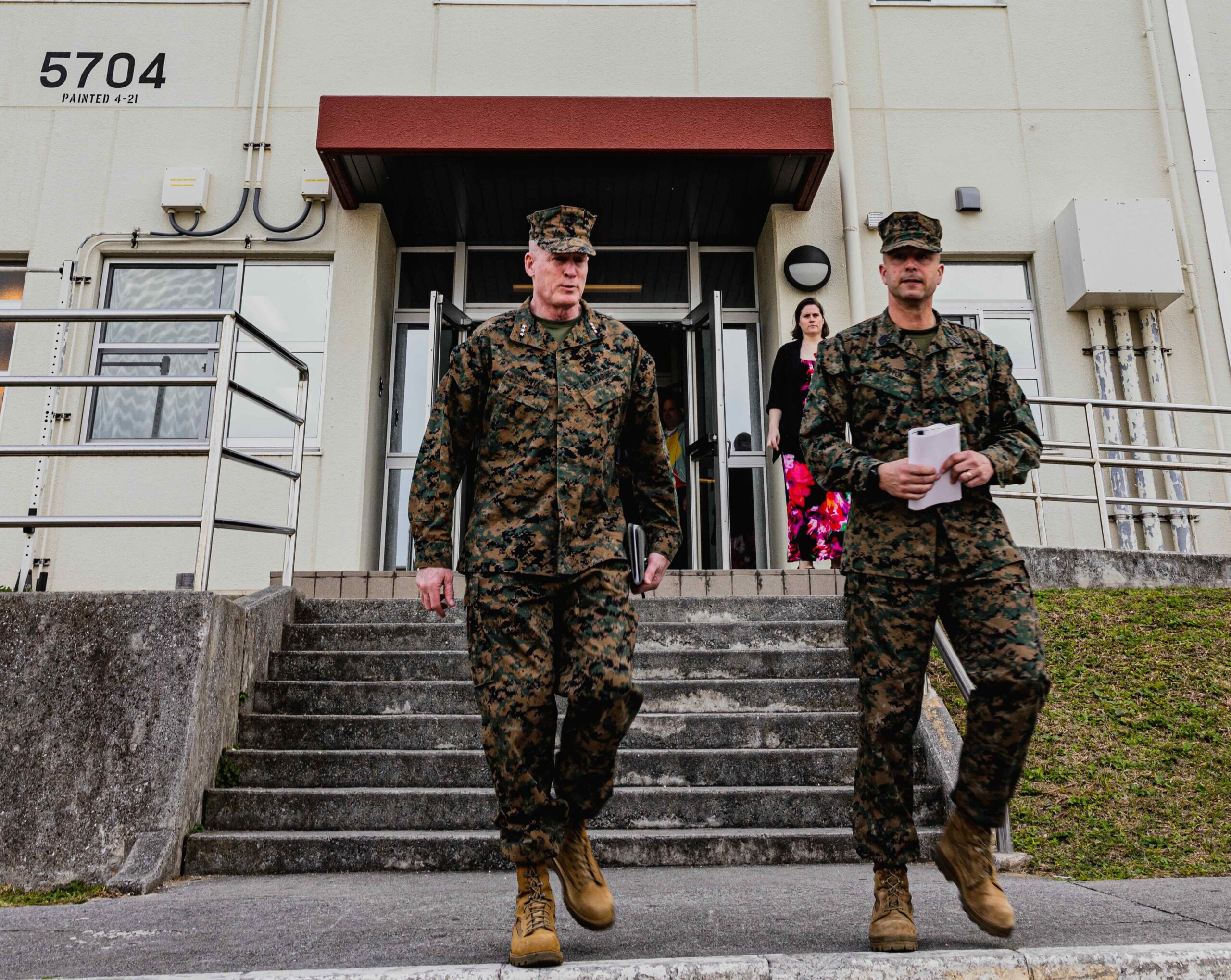U.S. Marine Corps Lt. Gen. Edward D. Banta, left, the Deputy Commandant for Installations and Logistics, and Sgt. Maj. Anthony J. Easton, right, sergeant major of Marine Corps Installations Pacific, exit a barracks during a command inspection on Camp Foster, Okinawa, Japan, Feb. 13, 2024. US Marine Corps Photo
In a shift from the last two years, the focuses on quality of life, as the service asks for $642 million toward barrack restoration and other services.
The top two priorities on the list are for barracks restoration and modernization and barracks support – both of which fall under the service’s Barracks 2030 quality of life initiative– while the third calls for force-wide modernization. The last priority also focuses on quality of life, with the service asking for $61 million for construction, planning and design of new barracks.
The wishlist asks for another $2.4 billion in total on top of what the service sought in last week’s budget request for Fiscal Year 2025. The attention to barracks in the unfunded priority list follows the introduction of Marine Barracks 2030 and Installations and Logistics 2030, two plans under the Force Design 2030 that are.
The Marine Corps needs $1.5 billion a year to bring its barracks up to good/fair condition, the . The service requested $274 million in its FY 2025 budget request.
The one-page unfunded priorities list does not specify what the $230 million for modernization and restoration and the $119 million for base operating support would fund.
Under the Marine Corps’ recently unveiled Barracks 2030 effort, the service plans to repair rooms and reconfigure the barracks footprint. There are also steps to standardize acquisition for furniture while also updating common areas, furnishings and recreational rooms on a 10-year cycle instead of over 32 years.
“Taking care of Marines is a warfighting function,” Marine Corps Commandant Gen. Eric Smith said in the fact sheet on Barracks 2030. “Otherwise, they cannot focus on the mission at hand. Barracks, chow halls and gyms are key to retaining Marines, and investments in quality of life initiatives are truly warfighting needs.”
Marine Corps Installations Command in February ordered an inspection of every barrack that had to be completed by March 15. The inspection order follows a series of pictures from barracks at the School of Infantry West, which showed a dead rat, mold and broken washing machines. The pictures were first reported by and also shared on social media.
In the past two years, the Marine Corps UPL has focused on amphibious warships, with the goal of the Navy maintaining 31 to allow the Marines to meet their expeditionary missions. For the first time since Fiscal Year 2022, the Marine Corps’ wish list is not seeking funds for the Navy to buy an amphibious ship. The Navy funded a San Antonio-class amphibious transport dock in its FY 2025 budget submission.
The items on the annual wishlist are ordered from highest to lowest priority. This year’s list calls for $1.24 billion for a range of items under Force Design 2030, with $72.85 million for advertising topping that section.
The Marine Corps is also seeking $340.9 million for the Amphibious Combat Vehicle program’s weapons-mounted variant and $250 million for two CH-53K heavy lift helicopters. While the ACV funding comes out of the Marine Corps’ procurement account, the helicopters are funded through the Navy’s aviation procurement account.
The service also wants $6 million in research and development funding for its Autonomous Low Profile Vessel, a inspired by drug-smuggling narco subs. The Marines already have a prototype of the drone that they’ve been testing on the west coast.
The third section of the list asks for $492 million for military construction. This includes construction funding for a maintenance hangar at Marine Corps Air Station Beaufort, S.C. and for F-35C Flightline Utilities Modernization Phase 2 at Marine Corps Air Station Cherry Point, N.C.
